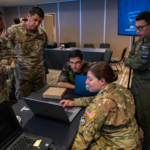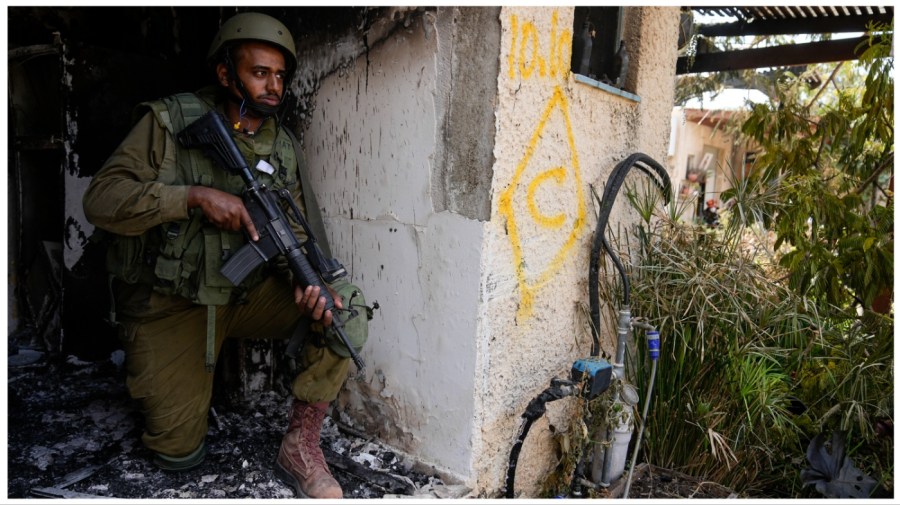Just In News | The Hill
Warning this article contains descriptions of death surrounding civilians and children.
The rocket fire that began around 7 a.m. on Saturday wasn’t particularly alarming for the residents of Israel’s kibbutz Kfar Azza. Communities closest with the Gaza Strip had grown used to the threat over about 15 years of intermittent war.
But the horror of Hama’s unprecedented attack on Israel quickly became apparent.
It was 5:32 a.m. in Portugal when Chen Kotler, an Israeli from the kibbutz Kfar Azza, was woken to the sound of an air raid siren on her phone, alerting her to a rocket attack on Israel.
A text message from her father, who was taking a walk in the field surrounding the kibbutz, showed a rocket being intercepted by Israel’s Iron Dome missile defense system.
Kotler told him to go home right away and to call her when he arrived. On the phone, her father started to explain that the security team for the community was responding to a “suspicious infiltration of a terrorist squad.”
“The second he said that, the same second, I hear Arabic,” Kotler said.
“Somebody speaks in Arabic. It’s like, I don’t know, it’s like a Hollywood movie. At the same second, I shout at my father, ‘The terrorist squad is here, run to the secure room! You run to the secure room. Lock the door!’ I hear everything, I’m still on the phone with him and the shooting starts.”
From Portugal, where Kotler was visiting her sister for the Jewish holiday of Sukkot, they started their own war-response room, coordinating over Whatsapp with her family members, the community and the Israeli Defense Forces (IDF), as soldiers sought to save civilians and battle Hamas infiltrators.
The messages in the Whatsapp group provide a chilling, minute-by-minute timeline of survival and death as events unfolded from Saturday to Monday.
“We’re starting to hear, more and more, people that are dead or wounded. You just hear somebody’s talking with somebody in the chat, and then he said ‘I hear the terrorist’ and that’s it. The chat is stopped,” she said.
“It took us about three days, until there was nobody to rescue, until we know there’s nobody to rescue anymore.”
Kotler’s father survived, rescued by the IDF after hours of hiding in his home. Her siblings, her nieces and nephews, friends visiting the kibbutz, her cousins and their children were all rescued.
But of the 600 people that were on the kibbutz at the time, Kotler said they know of 43 who were killed, 12 wounded, 26 missing, and six kidnapped — including a mother and four children.
Kotler spoke on a Zoom call Thursday evening, about midnight Israel time, to about 100 people, many who had once visited the kibbutz, where Kotler educates groups about living under rocket fire, but also about their deep connection to the land and their community.
“Now it’s a total loss. There’s no place to go back to,” she said.
Kotler estimates that about 300 Hamas fighters attacked the Kibbutz. Anger is rising among the Israeli public over the intelligence failure that allowed the Hamas assault – and the fecklessness of a supposedly impenetrable border that was knocked down with bulldozers, and skipped over by militants with motorized paragliders.
“[They were] coming from tunnels, from the fence, walking, traveling by drone, traveling with scooters and with cars. A pedestrian walk, really, from Gaza to our community,” Kotler said.
What follows is a timeline of events based on Kotler’s texts and recollections.
7:00 am – ‘People are already dead’
After the initial alert, Kotler starts communicating with the Kibbutz’s security team, who are trained to secure the community while waiting for the army to arrive.
She’ll learn later that with the break of dawn, the mayor of the community and most of the security team are already dead.
The houses of the community are grouped together in tight neighborhoods, and in the six houses surrounding her father’s home, she suspects the people inside are already dead.
“How do I know? Because some of them are my best friends, and you can see in the Whatsapp chat, the last minute they were seen [active].”
10:05 am – ‘We’re still under the impression, somebody’s going to come save them.’
Kotler gets a text from her sister, who’s house is right next to the kibbutz gate facing Gaza. They’ll later learn Hamas simply broke through to stream into the community.
“’We have them in our house, help us, call the security officer’ — they don’t know he’s dead by now,” Kotler said. “’There’s terrorists, call the emergency squad.’ Three minutes after, ‘Save us.’”
The family and their friends visiting – four adults and eight children, the youngest is two years old — go into the secure room which is also the children’s room because it is the safest place from rocketfire.
“They’re saying ‘call somebody,’ they’re texting ‘call somebody there’s no reception.’ We’re telling them ‘there are first responders, they’re on the way,’” Kotler recounted.
“We’re still under the impression, somebody’s going to come save them.”
At this point, the IDF unit had made it to rescue her father, but then had to return him to his home because their armored vehicle came under attack by three missiles fired from a rocket propelled grenade.
“They stopped, they can’t continue because they’re heavily bombed.”
The phones of Kotler and her sister in Portugal are lighting up with messages from another group chat.
There are young adults who live in dormitories on the kibbutz — from late teens to early 20s — who have come to the community in between finishing high school and their compulsory military service.
“They’re starting to text ‘terrorists, breaking our doors.’ There’s a chat from seven in the morning until night, and slowly, slowly, less and less people are on the chat,” she said.
“More people are texting, ‘Somebody is breaking my door,’ ‘I’m shot come to rescue me.’ Fifteen minutes later, ‘I’m shot come to rescue me.’ One hour later, nobody is there anymore.”
Kotler said they learned later the IDF troops were caught up in intense firefighting during this time, preventing them from rescuing her sister’s family or others.
“Now we know that for hours there was active war going on, and they can’t save them.”
3:37 p.m. – ‘They took phones from people they killed and they went into our chats’
For eight hours, her sister and brother-in-law are barricaded in the safe room of their home. They write that they can hear massive firefights occurring around them. Hamas is in the house, trying to break down the door of the safe room, shooting at the door.
“All the time they hear Arabic inside, and they’re texting, ‘no air, no water, electricity is down.’ They damaged electricity,” she said.
Then they came to another horrifying realization: Hamas had infiltrated their communications, taking the phones of the people they killed and reading the messages where people are sharing their locations, hoping to be rescued by the IDF.
“The result is that when we send location, ‘these people needs to be saved,’ [Hamas] also get it. People said, we realize it and we’re starting to be even more suspicious,” Kotler said.
“And even when IDF soldiers are coming to save people in the secure room, people don’t open the door sometimes because they think it’s terrorist.”
The situation is growing desperate. Some homes are on fire, forcing people to choose to suffocate or flee and risk being killed or taken hostage by Hamas.
“And we’re starting to hear, more and more people that are dead or wounded,” Kotler continued.
“You just hear somebody’s talking with somebody in the chat, and then he said ‘I hear the terrorist’ and that’s it. The chat is stopped. More and more families reporting, ‘we have terrorists in the house,’ ‘We have terrorists on the roof,’ ‘We have terrorists trying to break through the secure room.’ Not one, not two, not 10 — A lot of families, it’s like a mega event.”
Just after 8 p.m., after multiple attempts, the IDF rescued Kotler’s sister and the 11 other people in her home, she said.
The children are mute after hours of being kept silent. They’re soiled with feces, urine and vomit. As they are being evacuated by armored vehicle, her sister tells the children to cover their eyes and put their heads down, to avoid seeing the dead bodies lining the road.
She said some people contemplated killing their own families to prevent them from being taken hostage by Hamas.
Aftermath – ‘The kibbutz is a total loss’
Chen Kotler talks to a group of Americans visiting Kfar Azza in September 2022 about life for the residents on the border with the Gaza Strip. (Laura Kelly)
Kotler made it back to Israel earlier this week. She’s staying in the Israeli city of Caesarea just north of Tel Aviv. The survivors of the kibbutz are spread out across the country in temporary housing, piecing together what happened and what is to come.
“To find out that a lot of my friends, my neighbors in my neighborhood, there’s five people that were murdered. The house in front of me, the house next to me, two houses from me, my best friends,” she said.
She describes that for the children of the kibbutz, already traumatized by years of rocket fire and air raid sirens, are now “finding out about their dead friends, from the kindergarten, from school.”
Someone on the Zoom call asks about reports that 40 babies were beheaded in Kfar Azza. She says several babies were killed, but not that many.
Kotler and others are trying to raise funds for community members, who have been left with nothing but their lives. They have set up a website for donations, and that was partly the point of Thursday’s call.
The kibbutz is still a closed military zone because of active fighting. It’s unclear if or when the community will be able to return.
Kotler said most of the help that she and others have received so far has been from civil society and that the Israeli government has been “very, very slow to step in.”
“And this is why you realize that we are the ones that have to push. Whoever of us, that has the energy and the ability to push and to help our people,” she said.
Kfar Azza is just one of nearly a dozen border communities that was on the frontline of Hamas’s assault.
She anticipates that interest in their story and welfare will fade.
“We know that within 10 days, within two weeks, within three weeks, you know, everybody will lose interest in us, new things will come and we will stay with the pain, as refugees in our own land and this is why we decided to start raise funds now.”
Kotler ends the Zoom by apologizing for not responding to messages that came in over the past week asking if she was alive, if she was okay.
“Thank you for your heartwarming messages in the past few days. Sorry for not being able to answer. Not promising, I’m going to answer tomorrow. But your support is warming,” she said.
“I hope to see you within this year, between this Rosh Hashana and the next Rosh Hashana, in Israel in much more peaceful and nicer days. And I love you.”
International, Defense, Policy Read More
Author Profile
Latest entries
 ScienceOctober 23, 2024How guilt and shame control environmental decisions
ScienceOctober 23, 2024How guilt and shame control environmental decisions HeadlinesOctober 23, 2024WNBA champion Diana Taurasi continues to mull possible return next season: 'I think about it every day'
HeadlinesOctober 23, 2024WNBA champion Diana Taurasi continues to mull possible return next season: 'I think about it every day' ScienceOctober 22, 2024Space Force refining commercial backup plan for military satellites
ScienceOctober 22, 2024Space Force refining commercial backup plan for military satellites LifestyleOctober 22, 2024Rivian’s Halloween Update Includes Knight Rider And Back To The Future Costumes
LifestyleOctober 22, 2024Rivian’s Halloween Update Includes Knight Rider And Back To The Future Costumes

